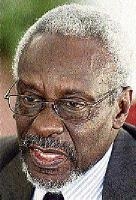Jason Abrahams leads telecoms consortium - Seeks to partner on Cuba/Venezuela fibre optic line
Published: Friday | May 22, 2009

P.J. Patterson ... advisor to Digicel on dealings with Cuba.
A group of Jamaican investors, led by Florida-based investment banker Jason Abrahams, has joined the mix of players hoping to partner a Venezuela/Cuban consortium that is on track for a licence to operate a US$70 million fibre optic cable to carry telecommunications traffic between Caracas, Havana, Kingston and the rest of the world.
Abrahams could not be immediately contacted for comment. But telecoms sources told the Financial Gleaner that Abrahams created a vehicle called DCFN, which formed an alliance with Jamaica Network Access Point (JNAP), a syndicate of small telecoms firms.
"They are actively lobbying to be chosen by the Cubans as the partners in the Jamaica operations and for an outward leg of the fibre optic link," said the source, who declined to be named because he was not authorised to speak publicly on the matter.
Abrahams' group is competing with established communications firms, LIME/Cable and Wireless, Digicel and Columbus Communications for the slot, on which Cuban officials are expected to decide shortly, informed sources here say.
Four years ago, JNAP was awarded a licence to lay a fibre optic cable between Jamaica and has so far failed to execute, apparently because of its inability to raise the financing.
Michael Lee Chin's Columbus Communications, which was awarded a licence at the same time, has since installed its link between Jamaica, the Dominican Republic and Miami and has since extended their reach to elsewhere in Latin America.
Now, Jamaica's Office of Utilities Regulation (OUR) is assessing the application by a state-owned Venezuelan/Cuban consortium called Telecommunicaciones Gran Caribe - the sole bidder from a request for applications in December - which proposes to lay a cable between Jamaica and Cuba, with a spur to Haiti, which lies just west of the two countries. Jamaica, at the closest point, is fewer than 100 miles south of Cuba.
But the plans for Gran Caribe - owned 60 per cent by the state-owned Telecom Venezuela and 40 per cent by Cuba's Telco Transbit - are far more expansive than the Jamaica/Cuba link, which, of itself, would give a substantial boost to Cuba's international telecommunications infrastructure, hobbled for decades by the American trade embargo.
Its plans include running nearly 1,000 miles of cable from Maiquet'a, in northern Venezuela, to Siboney in Cuba's eastern province of Santiago de Cuba.
Support 20 million calls
This facility, if built, will be able to support 20 million simultaneous telephone calls.
The Cuba/Venezuela leg of the cable, it is proposed, would have links to Venezuela's southern Caribbean neighbours, Trinidad and Tobago and the Dutch territory of Curacao.
It is not immediately clear how President Barack Obama's recent decision to allow America's telecoms firms greater freedom to do business with Cuba will impact on the overall Cuba/Venezuela fibre optic project, or the link between Jamaica and Cuba.
However, there has been a scramble among domestic telecoms players to position themselves as possible partners in the Jamaican leg of the venture.
For example, Columbus, which operates in Jamaica as Flow has long been in talks with the Cubans, as has been LIME/Cable and Wireless, the former monopoly provider of telecoms services. LIME/Cable and Wireless has fibre optic link between Jamaica and the Cayman Islands and into the United States.
Previous developments
Digicel, the Irish-owned mobile telephone provider launched in Jamaica at the start of the decade - but now operating across the Caribbean, Pacific and Central America - is also talking with Cuba, with the help of P.J. Patterson, former prime minister and international consultant.
Last week Patterson travelled to Havana with Digicel executives for negotiations with officials of Cuba's telecommunications ministry. Patterson also met informally with Ricardo Alcaron the president of the Cuban National Assembly, his old friend from their days as foreign ministers, but sources say that it was unlikely that the Digicel issue came up.
Digicel's Cuban wish apparently includes establishing its mobile phone operation in that country.
Should Havana decide on LIME/Cable and Wireless as its partners, that would preclude the need for an outward fibre optic cable to the United States, so as to provide global connections.
On the face of it, the choice of either Digicel, which does not own a fibre optic line, or the DCFN/JANAP consortium would require the additional build-out and additional investment of between US$15 million and US$20 million, Financial Gleaner sources said.
While the other firms in the fray have a track record of raising that kind of cash for their projects, there was no firm indication of how the DCFN/JANAP group would source the capital, especially in a difficult global credit market.
However, their supporters were confident that, if successful, they could raise the capital for their portion of the investment. Their backers have also sought to place a nationalist spin on their bid.
"When it comes down to it, Jamaicans have not been the big beneficiaries of the liberalisation of the market," explained one source. "It was part of the stated policy that while it was intended that economic, viable and efficient operations were essential, liberalisation should also make space for domestic players."
mark.titus@gleanerjm.com

















